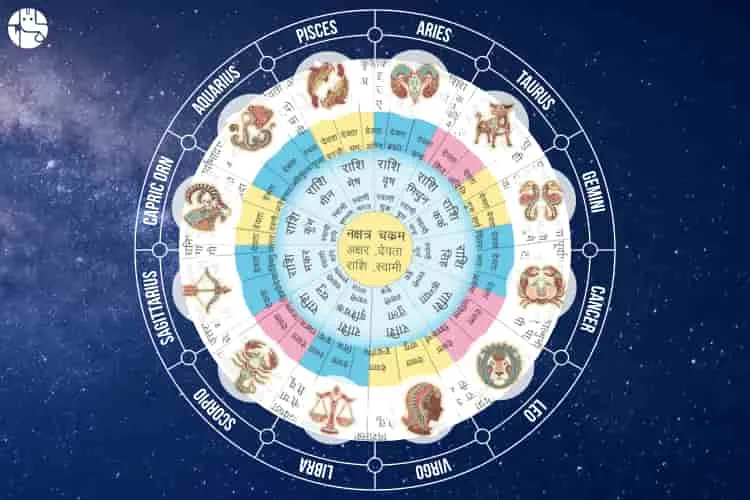How Important Are Nakashatras In Hindu Astrology, Stars Outside Solar System?

Astrology is chiefly about predicting human life & destiny and thereby bettering the living conditions of the people. In order to predict the future, this ancient science studies the writings on heaven. These writings are in the form of positions and combinations of various planets, stars & celestial bodies in the sky. As per our expert Astrologer, the movements of heavenly bodies are linked strongly to the lives of human beings on planet Earth.
Indian Astrology has mainly dealt with nine planets (Sun, Moon, Mercury, Venus, Mars, Jupiter, Saturn, Rahu & Ketu). But in recent times, if you talk to an Indian Astrologer, they include other outer planets like Uranus, Neptune and Pluto. An interesting topic is the importance of non-solar system heavenly bodies in Indian Astrology. Well, Indian Astrology believes in Nakshatras (constellations), which are stars outside the Solar System.
Read on to know about the importance of Nakshatras:
Nakshatras (Constellations)
The nakshatras or lunar mansions are 27 equal divisions of the night sky used in Hindu astrology, each identified by its prominent star(s).
Historical (medieval) Hindu astrology enumerated either 27 or 28 nakṣatras. In modern astrology, there is a use of a rigid system of 27 nakṣatras. In naming a new-born baby, the nakṣatra in which it was born, is taken into consideration.
Following are the 27 Nakshatras as per the Indian Astrology:
Ashvini
Symbol: Head of a Horse
Deities: Twin Brothers Ashvini Kumaras
Bharni
Symbol: Yoni (the female organ of reproduction)
Deities: Yama, the God of Death
Krittika
Symbol: Knife or spear
Deities: Agni, the God of fire
Rohini
Symbol: A cart or chariot
Deities: Brahma Deva or Prajapati, the creator of the universe
Mrighashirsha
Symbol: Deer’s head
Deities: Soma, the Moon God
Ardra or Aarudhra
Symbol: A Teardrop, a Diamond, or a Human head
Deities: Rudra, the God of destruction
Punarvasu
Symbol: A Bow and Quiver
Deities: Aditi, mother of the gods
Pushya
Symbol: Cow’s udder, Lotus, Arrow and Circle
Deities: Brihaspati, priest of the Gods
Aslesha
Symbol: Serpent
Deities: Sarpas or Nagas, the deified snakes
Magha
Symbol: Royal Throne
Deities: Pitris, the family ancestors
Purva Phalguni
Symbol: Front legs of bed, hammock or fig tree
Deities: Bhaga, the god of good fortune and prosperity
Uttara Phalguni
Symbol: A bed or two rear legs of a cot
Deities: Aryaman, the god of patronage and favours
Hasta
Symbol: A hand or fist
Deities: Chandra (the planet Moon)
Chitra
Symbol: A bright jewel or pearl
Deities: Mangal (the planet Mars)
Swati
Symbol: The shoot of a plant, coral
Deities: Rahu (north lunar node)
Vishakha
Symbol: A Triumphal arch, potter’s wheel
Deities: Indra, chief of the Gods; Agni, God of Fire
Anuradha
Symbol: A Triumphal archway and lotus
Deities: Shani (the planet Saturn)
Jyeshtha
Symbol: A circular amulet, umbrella and earring
Deities: Indra, chief of the gods
Moola
Symbol: Bunch of roots tied together
Deities: Nirrti, goddess of dissolution and destruction
Purva Ashada
Symbol: Elephant tusk, fan, winnowing basket
Deities: Apah, God of water
Uttara Ashada
Symbol: Elephant tusk, small bed
Deities: Visvedevas, universal gods
Shravana
Symbol: Ear or Three Footprints
Deities: Vishnu, preserver of the universe
Dhanishta
Symbol: Drum or flute
Deities: Eight Vasus, deities of earthly abundance
Shatabhishak
Symbol: Empty circle, 1,000 flowers or stars
Deities: Varuna, the god of cosmic waters, sky and earth
Purva Bhadrapada
Symbol: Swords or two front legs of funeral cot, a man with two faces
Deities: Ajikapada, an ancient fire dragon
Uttara Bhadrapada
Symbol: Twins, back legs of funeral cot, snake in the water
Deities: Ahir Budhyana, serpent or dragon of the deep
Revati
Symbol: Fish or a pair of fish, drum
Deities: Pushan, nourisher, the protective deity
Get a chance to avail your free astrology reports now!
With Ganesha’s Grace,
The GaneshaSpeaks Team



